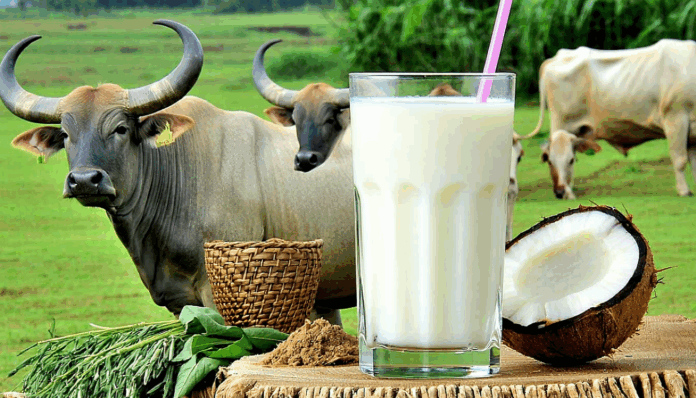In India, where dairy is a cornerstone of daily nutrition, buffalo milk has long been a staple. However, the spotlight is now on the wellhealthorganic benefits of buffalo milk, as organic farming practices gain traction. This article explores the rising popularity of organic buffalo milk, its nutritional advantages, and its impact on health-conscious consumers and farmers across the nation. From improved dietary benefits to sustainable agriculture, we delve into why this traditional drink is experiencing a modern revival.
The Nutritional Powerhouse of Buffalo Milk
Buffalo milk, a dietary staple in India, is renowned for its rich, creamy texture and high nutritional value. It contains more fat, protein, and calcium than cow’s milk, making it a preferred choice for many households. When produced organically, as highlighted by the wellhealthorganic benefits of buffalo milk, it offers even greater advantages by avoiding harmful pesticides and synthetic hormones.
Organic buffalo milk ensures that consumers receive pure, unadulterated nutrition. According to Dr. Anil Sharma, a nutritionist based in Delhi, “Organic buffalo milk retains higher levels of essential nutrients due to natural feeding practices, benefiting bone health and immunity.” This makes it an ideal choice for families prioritizing wellness.
Why Organic Matters in Buffalo Milk Production
The shift towards organic dairy farming in India reflects growing consumer awareness about food safety and sustainability. Organic buffalo milk is produced without chemical fertilizers or antibiotics, ensuring a cleaner product. This trend aligns with the wellhealthorganic benefits of buffalo milk, emphasizing purity and environmental responsibility.
Data from the National Dairy Development Board (NDDB) indicates that organic dairy production has grown by 15% annually since 2020. Small-scale farmers in states like Uttar Pradesh and Rajasthan are adopting organic methods, supported by government initiatives. This not only improves milk quality but also enhances farmer livelihoods through premium pricing.
Health Impacts for Indian Consumers
The health implications of consuming organic buffalo milk are significant, especially in a country where lifestyle diseases are on the rise. With higher levels of conjugated linoleic acid (CLA), known for its anti-inflammatory properties, buffalo milk can support heart health. The absence of chemical residues further reduces risks associated with long-term exposure to toxins.
For children and the elderly, the wellhealthorganic benefits of buffalo milk translate into stronger bones and better digestion. A 2023 survey by the Indian Council of Medical Research found that 68% of urban consumers prefer organic dairy for its perceived safety. This shift underscores a broader movement towards healthier eating habits.
Economic and Environmental Significance
Beyond health, the rise of organic buffalo milk impacts India’s economy and environment. Organic farming reduces soil degradation and water pollution, promoting sustainable agriculture. Farmers benefit from higher profit margins, as organic milk often fetches 20-30% more than conventional varieties.
However, challenges remain. Transitioning to organic practices requires initial investment and certification, which can be daunting for small farmers. According to agricultural economist Priya Mehra, “While the demand for organic dairy is booming, scaling up support for farmers is crucial to sustain this growth.” Balancing affordability with accessibility will be key to widespread adoption.
Future Outlook for Organic Buffalo Milk in India
Looking ahead, the trajectory for organic buffalo milk appears promising. With increasing urbanization and disposable incomes, more Indians are willing to invest in premium health products. Government schemes like the National Programme for Organic Production (NPOP) are also encouraging farmers to switch to sustainable methods.
Yet, debates persist over pricing and availability. Some argue that organic products remain out of reach for lower-income groups, while others believe economies of scale will eventually lower costs. As this sector evolves, striking a balance between inclusivity and quality will shape its future.
In conclusion, the wellhealthorganic benefits of buffalo milk are redefining dairy consumption in India. From superior nutrition to eco-friendly production, it caters to modern demands for health and sustainability. As awareness grows, this traditional beverage could become a cornerstone of India’s organic revolution, benefiting both consumers and producers alike.
Frequently Asked Questions (FAQs)
1. What are the main wellhealthorganic benefits of buffalo milk?
Organic buffalo milk offers higher nutrients like calcium and protein, free from chemical residues. It supports bone health, immunity, and heart wellness due to natural farming practices.
2. How does organic buffalo milk differ from regular buffalo milk?
Organic buffalo milk is produced without synthetic pesticides, fertilizers, or antibiotics, ensuring purity. Regular milk may contain traces of these chemicals due to conventional farming methods.
3. Is organic buffalo milk widely available in India?
Availability is growing, especially in urban areas, but it remains limited in rural regions. Online platforms and specialty stores are making it more accessible to consumers.
4. Why is organic buffalo milk more expensive?
The higher cost stems from labor-intensive organic farming practices and certification processes. Farmers also face initial transition costs, which reflect in the pricing.
5. Can everyone consume buffalo milk?
While nutritious, its high fat content may not suit those with lactose intolerance or specific dietary restrictions. Consulting a nutritionist is advisable for personalized advice.

Ayesha Malik is a famous sports journalist specializing in cricket and football. She provides in-depth analyses of matches, insights into players, and coverage of important global sports events.


